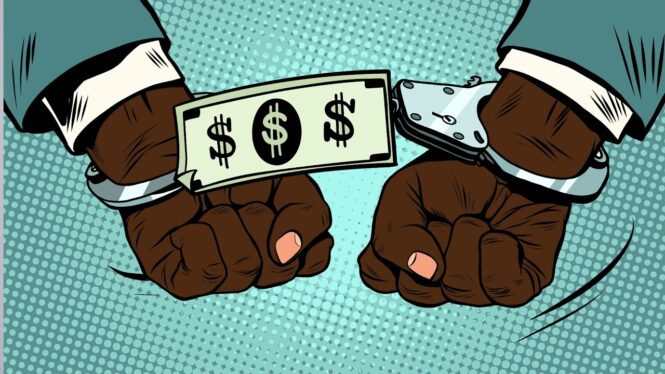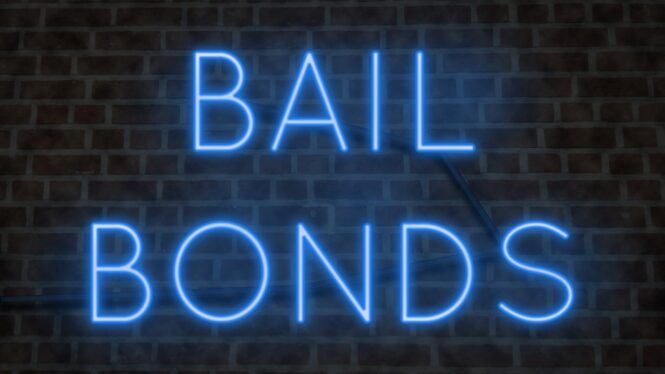The bail system serves a fundamental role in the U.S. criminal justice system. When a person is arrested and charged with a crime, they may be required to pay a specific amount of money to be released from custody until their trial date. This ensures that they return to court as required.
Given the significant impact this can have on one’s immediate freedom, financial resources, and future legal proceedings, understanding the difference between bail bonds and cash bail is crucial. These two options offer different pathways for securing one’s release, each with its own set of advantages and disadvantages.
This article examines the bail process, primarily focusing on the distinctions and implications of choosing between cash bail and bail bonds. We will explore the pros and cons of each, provide scenarios to illustrate which option might be best under certain circumstances, and offer guidance on factors to consider when making this decision.
Cash Bail

Cash bail is the direct payment to the court, serving as a financial assurance of the defendant’s return to face charges. When using cash bail, the accused or a representative pays the entire amount stipulated by the court. It’s worth noting that this amount is typically returned once the defendant fulfills their commitment to appear for all court dates.
Pros
The entire amount is returned upon meeting all court conditions, ensuring the defendant’s financial responsibility is reimbursed. This method steers clear of third-party interventions, simplifying the process. One can take solace in the fact that there are no hidden or additional fees attached.
Cons
The foremost concern is its potential costliness, which may be out of reach for many, rendering immediate release impractical. By committing a substantial sum to bail, individuals might find their funds, which could be utilized elsewhere, locked up for an extended period. A looming risk exists: should the defendant fail to attend a court date, there’s a real threat of the hefty amount being forfeited.
See how cash bails undermine community safety.
Bail Bonds

Differing from cash bail, bail bonds involve an agreement with a third-party agent. By paying a fraction of the total bail, the bail bond agent assures the court of the defendant’s return. The agent acts as a guarantor, ensuring that the defendant will be present for all court-related appointments.
While this option might seem economical upfront, the defendant or their representative pays a non-refundable premium to the bail bond agent. Additionally, collateral may be required as a backup assurance.
Pros
Primarily, they eliminate the need to pay the full bail amount upfront, requiring only a fraction. This becomes particularly beneficial when the defendant doesn’t have immediate access to the total cash amount set by the court. Bail bond agencies aren’t just financial intermediaries; they often guide defendants through the bail process, helping to demystify its complexities.
Cons
The premium paid to the bail bond agent is non-refundable, meaning even if the defendant meets all court requirements, that portion of the money won’t be recovered. If the defendant decides to skip court, any collateral provided – which could be property or other valuable assets – is at risk of being seized. Some bail bond agencies might charge extra fees for services like ensuring a defendant’s court appearance or locating them if they abscond.
Factors to Consider When Choosing Between Cash Bail and Bail Bonds

Financial Capacity
While cash bail requires a larger sum upfront, it can be fully returned if court conditions are met. On the other hand, affordable bail bonds are less burdensome financially. However, you’ll forfeit the agent’s fee irrespective of the trial’s outcome.
Risk Assessment
If there’s a high likelihood of the defendant not showing up in court, the risks associated with forfeiture in cash bail or losing collateral in bail bonds rise considerably.
Duration Until Trial
Consider the time span your funds might be inaccessible. If the trial is anticipated to be protracted, a large sum in cash bail might be tied up for an extended period, potentially straining financial liquidity. Bail bonds, with their smaller upfront fee, might be more feasible in such cases.
Comfort with Third-party Involvement

Some individuals prefer direct dealings with the court system, avoiding intermediary agents. However, others might find the expertise and guidance of a bail bond agent comforting, especially if they’re unfamiliar with the bail process.
Legal Recommendations and Consequences
Always consult with legal professionals. Their insights, based on experience and understanding of the system, can provide invaluable guidance. They’ll outline potential legal consequences of each option, ensuring you’re fully informed before making a decision.
Real-life Scenarios: Which Option is Best?
In practical situations, the choice between cash bail and bail bonds can be illuminated through real-life examples. Consider Jane, a single mother with limited savings. When faced with a hefty bail amount, she might lean towards a bail bond, enabling her to preserve her cash reserves for immediate family needs. Conversely, Mike, a retiree with substantial savings, could opt for cash bail, confident in his planned court appearances and the prospect of reclaiming his funds.
In another scenario, a young college student unfamiliar with the judicial system might prefer the guidance of a bail bond agent, ensuring they navigate the process correctly. These illustrative cases emphasize that the best option often hinges on individual circumstances and priorities.
Understanding the nuances between cash bail and bail bonds is necessary for making informed decisions that align with personal and financial circumstances. Both options carry their distinct advantages and challenges, and the choice often depends on individual scenarios, financial capabilities, and comfort levels. By arming oneself with knowledge and seeking legal guidance, one can make decisions with confidence and clarity.
 Imagup General Magazine 2025
Imagup General Magazine 2025

